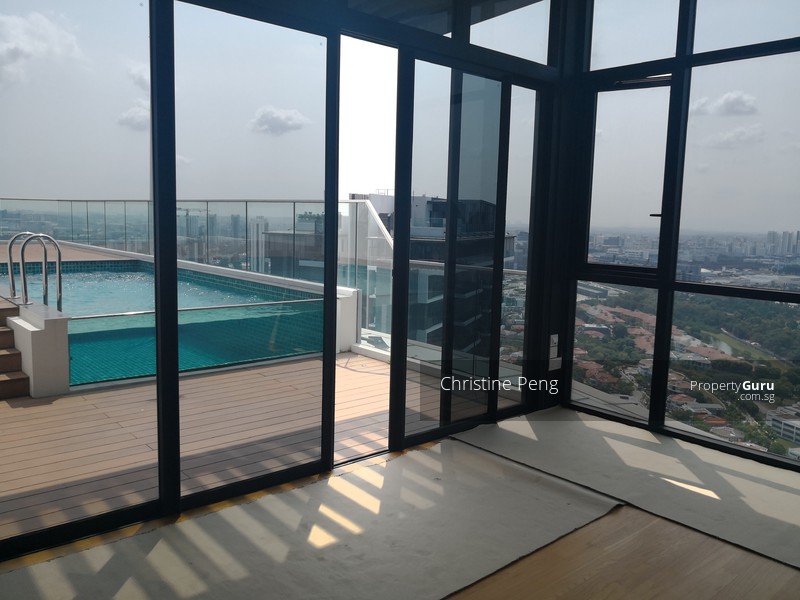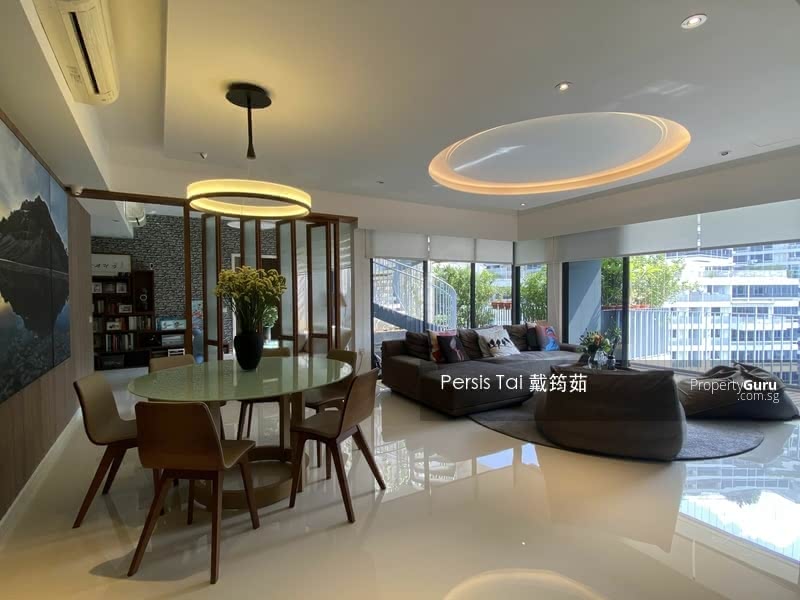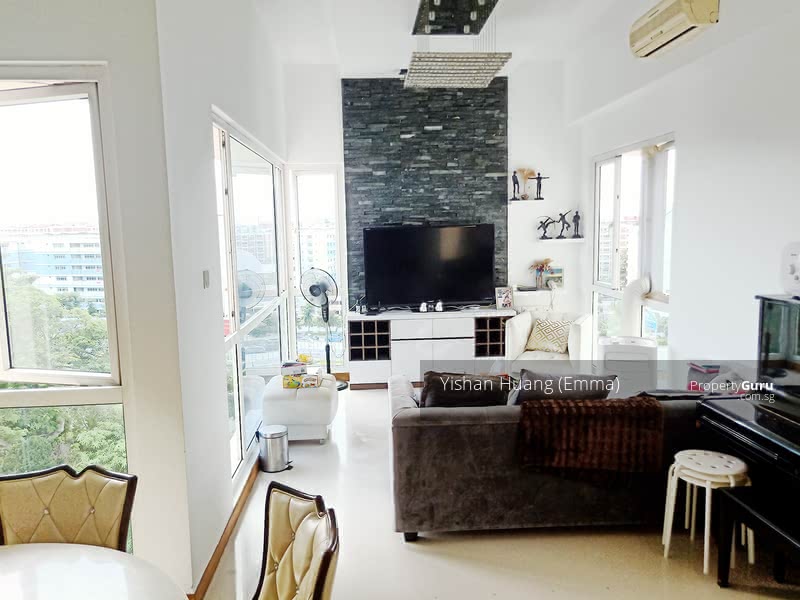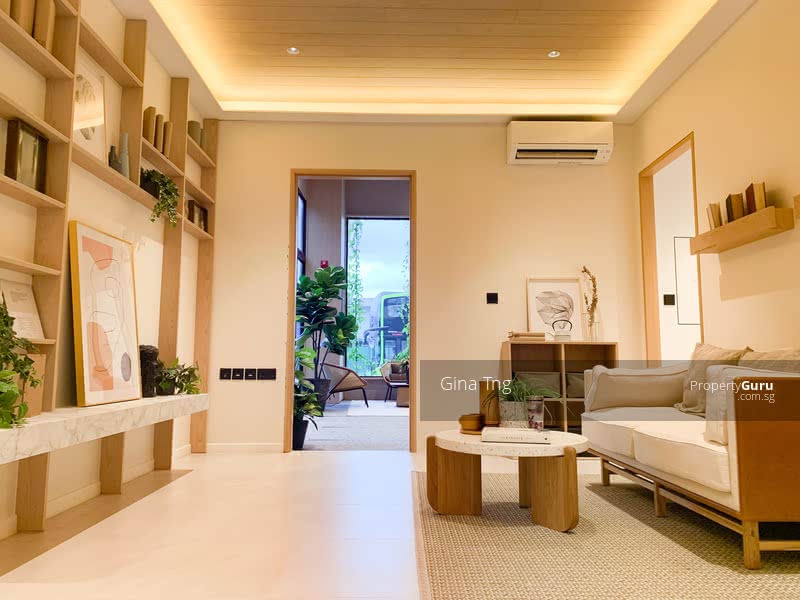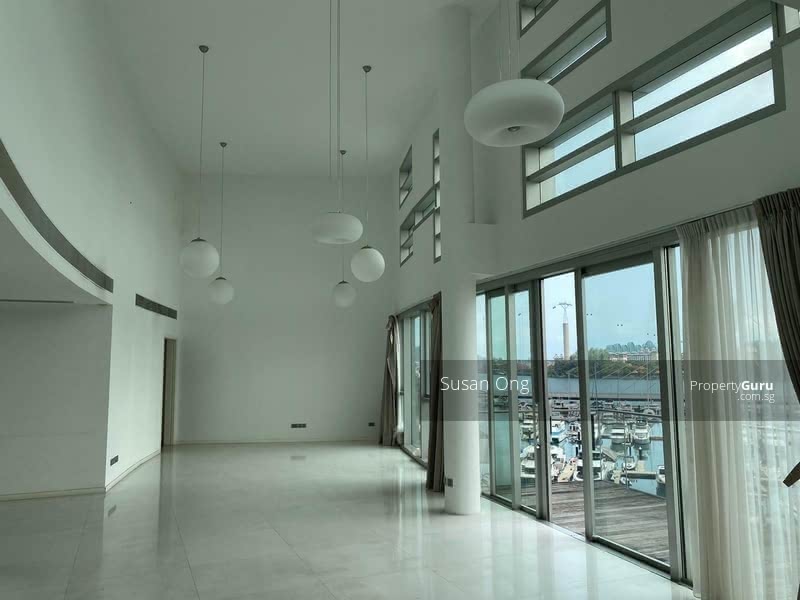June 14, 2021

Are you looking to buy a penthouse unit? Whether you want a bigger home for you and your family or if you want to draw-dropping views of the city, a penthouse is regarded as a status symbol and is one of the most expensive types of homes you can buy in Singapore.
So without further ado, below are eight luxury penthouses that are available for sale on PropertyGuru now.
What Is a Penthouse Unit?
Traditionally, a penthouse is known as a unit located on the highest floor of a development. However, these days it’s used to describe a unit that’s located on the top few floors. Penthouses are considered the pinnacle of non-landed housing, and are also the priciest in the entire development.
Aside from that, penthouses are also larger than ordinary apartment units, and often have two storeys.
Penthouses can be found in condominiums, commercial buildings, and even HDB flats (penthouse maisonettes — executive maisonettes located on the top floors), however, there are also super penthouses which are defined as being 10,000 sq ft and above – that’s 10 times the size of an average 4-room HDB flat! Singapore has six of 11 super penthouses in the world.
Billionaire James Dyson’s former $73.8 million penthouse at Wallich Residence, is a prime example of a super penthouse. Dubbed as the ‘bungalow in the sky’, the three-storey, 21,108 sq ft penthouse boasts five bedrooms that each have their en-suite bathrooms and walk-in closets, a dining room, a living room, an entertainment room, a dry and wet kitchen, a private pool, cabana, jacuzzi room, among other luxury features.
What Are the Benefits of Living in a Penthouse?
1. You Get Super Good Views of the Surrounding Area
Living at the top of the world not only makes everything below look like ants, but you’ll also get to enjoy excellent views of the surrounding area (unobstructed views of Marina Bay and Sentosa Island if you live in one of the penthouses in Wallich Residence, for example). This is in stark contrast to most HDB or even condo households, where your views would likely be obstructed by another development.
2. You have More Space And Amenities
Needless to say, being the biggest units in the entire development means that penthouses are spacious, and the average size of penthouses are usually more than enough for families. As mentioned above, penthouses also tend to have higher ceilings, which help to create an elevated feel.
Aside from that, developers also reserve the best fittings and appliances for penthouse units (for example, marble flooring or fixtures from premium brands), and you can also enjoy having your own private facilities such as an outdoor rooftop garden, jacuzzi, and swimming pool, among others.
3. You Have More Privacy
Penthouses also offer better peace and privacy; Located high above, you don’t have to worry about street noise. Most often than not, a penthouse unit is the only unit on the entire floor, so you don’t have to worry about noisy neighbours too.
You also have your own private lift, which is really convenient because you can go straight up to your unit without waiting for others.
Penthouse Units For Sale in Singapore
1. Wallich Residence
|
Developer |
GuocoLand |
|
District |
2 |
|
Size |
3,509 sq ft (four bedrooms, four bathrooms) |
|
Year of completion |
2018 |
|
Price |
$17,840,050 |
Where else to start than at the top of the food chain, Wallich Residence? Developed by GuocoLand, Wallich Residence is located on top of Guoco Tower, a 99-year leasehold mixed development in Tanjong Pagar and Singapore’s tallest building.
Most famously, the super penthouse is known to be the former home of James Dyson. However, there are also four junior penthouses in the development. Only one 3,509 sq ft unit remains unsold. This unit comes with four bedrooms, four ensuite bathrooms, a living and dining room, as well as a dry and wet kitchen. You also have your own outdoor deck for breathtaking views of the city, and your own private lift access, which is directly linked to the Tanjong Pagar MRT station.
Wallich Residence’s location in the heart of the CBD needs no further introduction; the condo is extremely accessible and convenient, and residents will have direct connectivity to shopping, food and entertainment options.
Check out this unit’s listing on PropertyGuru.
2. The Trilinq
|
Developer |
IOI Group |
|
District |
5 |
|
Size |
3,661 sq ft (four bedroom, four bathrooms) |
|
Year of completion |
2017 |
|
Price |
$4,278,888 |
Spanning 3,961 sq ft, this penthouse unit at The Trilinq at Clementi offers a 360 degree view of the surrounding area. Despite its spaciousness, the unit has an efficient layout, with no bay window and no bomb shelter to ensure that living space is maximised.
There are also various facilities within the condo, including an indoor gym, a fitness zone, a tennis court, a jogging trail, a pine forest trail, and a lap pool.
The development is also within walking distance to a wide-range of shopping and dining options, including the Clementi Mall, which is five minutes away by foot, whilst IMM in Jurong is just a 5-minute drive away.
Meanwhile, parents with schooling children will be glad to know that several prominent schools in the Clementi area such as Nan Hua Primary School, Clementi Primary School, and Clementi Town Secondary School are nearby.
Checkout this unit’s listing on PropertyGuru.
3. Mon Jervois
|
Developer |
UIC |
|
District |
10 |
|
Size |
2,626 sq ft (four bedrooms, four bathrooms) |
|
Year of completion |
2016 |
|
Price |
$3,020,000 |
Mon Jervois is a 99-year leasehold development located in the Jervois enclave in District 10. This penthouse unit is located on the fifth floor (the highest floor), however, residents can still enjoy good surrounding views as the project is a low-density development.
It also comes with a private roof terrace, jacuzzi, and an unblocked pool view, and the unit is also equipped with high-end materials such as a marble feature wall.
Facilities-wise, you’ll get an indoor gym, BBQ pits, lap pool, kids’ pool, and picnic lawn, among others. There are also various dining, shopping, and schooling options nearby including Dawson Place, AnchorPoint Mall, Crescent Girls’ School, Alexandra Primary School, and Gan Eng Seng School. In terms of connectivity, Redhill MRT station is about eight minutes away, while residents with motor vehicles can reach the CBD via the Central Expressway (CTE) in six minutes.
Checkout this unit’s listing on PropertyGuru.
4. The Interlace
|
Developer |
CapitaLand |
|
District |
4 |
|
Size |
4,479 sq ft (three bedrooms, three bathrooms) |
|
Year of completion |
2013 |
|
Price |
$4,600,000 |
This 3-bedroom penthouse unit at The Interlace features three floors and comes with a living room, dining area, kitchen, and a penthouse garden. Furthermore, the unit has been renovated and is therefore in move-in condition.
The Interlace is one of Singapore’s most iconic and recognisable buildings. The award-winning project has 1,040 units ranging from 2- to 4-bedrooms, as well as garden house units and penthouses.
The condo also features a 50-metre lap pool, water park, tennis court, as well as retail stores for groceries so that you don’t have to leave the confines of the development for your daily essentials.
Checkout this unit’s listing on PropertyGuru.
5. Naturalis
|
Developer |
Abacus Development Pte Ltd |
|
District |
15 |
|
Size |
1,561 sq ft (one bedroom, one bathrooms) |
|
Year of completion |
2011 |
|
Price |
$1,550,000 |
Most penthouses are at least 2 bedrooms or more, however, this 1-bedroom penthouse in Naturalis condo is perfect for singles or couples who want a bigger space. Located in District 15, the penthouse spans 1,561 sq ft and features a spacious living and kitchen area. The bedroom is located on the first floor whilst the living and dining areas on the ground floor, providing privacy especially when you guests.
Being in District 15 means you’re never too far away from popular restaurants, shopping malls, and schools in the area. For malls, take your pick between Katong Point, Katong Square, and Parkway Parade; whilst nearby schools include Ngee Ann Primary School, CHIJ (Katong) Primary, St. Patrick’s School, and Tanjong Katong Secondary School, among many others.
Checkout this unit’s listing on PropertyGuru.
6. Savannah Condopark
|
Developer |
City Developments Limited |
|
District |
18 |
|
Size |
2,294 sq ft (four bedrooms, four bathrooms) |
|
Year of completion |
2005 |
|
Price |
$1,798,000 |
If you’re looking for an affordable penthouse, look no further than this penthouse unit at Savannah Condopark. For just $1.8 million, this 2,294 sq ft unit comes with four bedrooms, a kitchen, a yard area, and a roof terrace.
Residents can also enjoy the facilities in the development including a barbeque area, swimming pools, a jacuzzi, a tennis court, playground, and a bowling alley. For those who drive, Orchard Road can be easily accessed via Pan-Island Expressway (PIE) and Stevens Road in 15 to 20 minutes.
Apart from that, Savannah Condopark is also close to schools such as East Spring Primary School, East Spring Secondary School, Ngee Ann Secondary School, and The Japanese School Singapore Changi Campus.
Checkout this unit’s listing on PropertyGuru.
7. Tedge
|
Developer |
City Developments Limited |
|
District |
18 |
|
Size |
1,033 sq ft (four bedrooms, four bathrooms) |
|
Year of completion |
2022 |
|
Price |
$1,619,000 |
Macly’s mixed-development Tedge in District 14 consists of 42 units, including 3- and 4-bedroom penthouses. Though the penthouses aren’t as spacious as conventional penthouses, they feature intelligent layouts to minimise space wastage whilst maximising livable space. Furthermore, the units are freehold and north-south facing.
Located in a well-connected good area known for its wide-variety of amenities, Tedge is within walking distance to Kembangan MRT station, and schools within close proximity include Eunos Primary School, CHIJ Katong, and Tanjong Katong Secondary School. The stretch along the nearby Changi Road also offers a great variety of food options. In short, conveniences and amenities are never too far away.
Checkout this unit’s listing on PropertyGuru
8. Reflections at Keppel Bay
|
Developer |
Keppel Bay Pte Ltd |
|
District |
4 |
|
Size |
6,835 sq ft (six bedrooms, six bathrooms) |
|
Year of completion |
2013 |
|
Price |
$14,000,000 |
Home to one of the six super penthouses in Singapore, the iconic Reflections at Keppel Bay towers overSentosa Island with its curved towers. The 99-year leasehold development also houses 35 penthouses amongst its 1,129 units and has become known as a landmark for luxury waterfront living.
Aside from waking up to the smell and sight of the sea, the penthouse also offers direct views of the Marina and Sentosa areas. Spanning 6, 835 sq ft, this penthouse has six bedrooms and the same number of bathrooms. Additionally, there’s a wet and dry kitchen, a jacuzzi, a private roof terrace and your own private lift lobby, among other opulent features.
The property is also within walking distance to VivoCity mall, as well as Harbourfront and Telok Blangah MRT stations. Sentosa Island and Resorts World Sentosa are also easily accessible by car, and are about five minutes away. Nature lovers will also appreciate that Labrador Park and the Southern Ridges are within close proximity.
Checkout this unit’s listing on PropertyGuru.
Other FAQs About Penthouses
What Is the Most Expensive Condo in Singapore?
The most expensive penthouse in Singapore is a super penthouse at Wallich Residence; billionaire James Dyson paid $73.8 million for it in 2019, but sold it a year later at a $11.8 million loss.
What is a Penthouse?
A penthouse is a unit located at the top floor of a high-rise development. Not only is it the most expensive unit of the entire development, but also the biggest.
How Much Does a Penthouse Cost?
Entry-level penthouses can cost around $2 million, but super penthouses can cost a lot more. James Dyson paid $73.8 million for his former penthouse in Wallich Residence.
For more property news, resources and useful content like this article, check out PropertyGuru’s guides section.
Are you looking to buy a new home? Head to PropertyGuru to browse the top properties for sale in Singapore.
Already found a new home? Let PropertyGuru Finance's home finance advisors help you with financing it.

Most Singaporeans can't imagine owning an HDB flat without using their CPF money to pay for it. While some complain about how their CPF money is “locked” up, the compulsory savings scheme is no doubt a major factor that has helped Singaporeans achieve such a high homeownership rate. On top of using CPF money, the CPF Housing Grant, or HDB Grant, is another important policy that is helping Singaporeans cope with the high cost of home purchase. If you're eligible for these grants as a first-time buyer, the cost of your HDB flat can be reduced by more than $100k!
In September 2019, changes were made to HDB grants which made home purchase even more affordable for first-time homeowners. These changes are summarised below:
- Income ceilings will be raised to $14,000 for HDB BTO flats, and $16,000 for executive condominiums (ECs)
- The Enhanced CPF Housing Grant (EHG) will replace the existing Additional and Special CPF Housing Grants (AHG and SHG)
- Eligible first-timers can now benefit from the EHG when buying new or resale flats, regardless of flat type and location
RECOMMENDED ARTICLE: HDB’s New Enhanced CPF Housing Grant (EHG) And Higher Income Ceilings: What You Need To Know
But is relying on HDB grants for your home purchase be a problem? Are there situations where you shouldn’t take the grant?
Definitely. Here, we have a look at the implications of taking up CPF Housing Grants:
1. The HDB Grant Money Will Have to Be ‘Returned’
The cumulative amount from the various HDB grants can help flat buyers save a lot of money. Most Singaporeans gladly say 'yes' to the grants when buying their first home.
But nothing is free, so to speak. In fact, these grants may have to be ‘returned’ to your CPF account, in one way or another.
Firstly, HDB grants are credited into your CPF account and are not disbursed in cash.
Secondly, when you sell the property, you’ll have to return the HDB grant amount to your CPF account. Additionally, the housing grant you’ll have to return includes a 2.5% accrued interest, which is the interest you would have earned if your grant amount had been sitting in your CPF Ordinary Account instead of being used to pay for your home (see our next point).
Other than that, you might incur a resale levy when you decide to sell your flat to buy another HDB BTO or EC. HDB's resale levy is used to maintain a fair allocation of public housing subsidies between first-timers and second-timers, by reducing the subsidy Singaporeans may enjoy for their second HDB flat or EC purchase.
The resale levy is only applicable in some cases:
- You dispose of your HDB BTO and then buy a second subsidised flat from HDB
- You dispose of your HDB BTO and then buy an EC from a developer
In other words, you need not pay a resale levy if you are buying any of these:
- HDB resale flat
- Private residential property
- A Design, Build and Sell Scheme (DBSS) flat from a developer
- An EC from a developer, where the land sale was launched before 9 December 2013
Have you heard? PropertyGuru Finance is an online mortgage marketplace where you can compare the best home loan rates in town and access personalised home financing advice and recommendations tailored to your unique needs - all for free!
2. Accrued Interest From CPF Housing Grant
The main downside of using CPF money to finance your property purchase is the accrued interest payable.
Accrued interest is the interest amount that you would have earned if your CPF money had not been withdrawn for your home purchase. The accrued interest payable is computed on the CPF principal amount withdrawn for housing on a monthly basis and compounded yearly.
Whenever one uses their CPF money, whether to finance the downpayment of the property or to service the monthly mortgage loan, you will incur accrued interest which you’d need to return to your CPF account.
Let’s take a look at the difference in how much one will pay if you took a bank loan, and if you: 1) Use CPF for downpayment only, 2) Use CPF for downpayment and monthly home loan repayment, 3) Don't use any CPF at all:
| Scenario | Total accrued interest for a $500,000 flat |
| Using CPF for downpayment only (20% downpayment) | $42,244 over 30 years |
| Using CPF for downpayment and monthly home loan repayment | $899,338 (after 30 years) |
| The ‘No CPF and CPF Housing Grant’ approach | $0 |
Scenario 1: Using CPF for Downpayment Only
Let’s assume you are buying an HDB flat that costs $500,000. Of which, you paid 5% cash downpayment of $25,000 and the rest of the 20% ($100,000) using CPF money.
Assuming you held onto your flat for 30 years, you’d end up with $42,244 of interest payments due, bringing the total sum you’d have to return to your CPF to $142,244. This is calculated based on the current CPF ordinary account interest of 2.5%.
Scenario 2: Using CPF for Downpayment and Monthly Home Loan Repayment
So you’ve decided that it’d be easier on your pockets to service the monthly home loan payment using money from your CPF Ordinary Account (OA) as well. Assuming you’ve first used the $100,000 from your CPF as downpayment, and you took a home loan of $400,000 from the bank. Based on a bank loan interest of 2.0% for a tenure of 30 years, your bank loan interest will come up to a total of $132,252. The total amount payable will be $532,252.
But that’s not all. Because you have chosen to pay your monthly loan with your CPF, you’d need to repay the accrued interest as well! Given the CPF interest rate of 2.5%, the extra amount you’d need to return to your CPF account for the loan of $532,252 will come up to $224,842.
In summary, for a $500,000 HDB flat purchase with a 2.0% home loan and a 30-year tenure:
|
|
Downpayment with CPF money and grants |
Home loan |
|
Withdrawal from CPF |
$100,000 |
$400,000 + $132,252 |
|
Accrued Interest |
$42,244 |
$224,842 |
|
Total payable to CPF |
$142,244 |
$757,094 |
So essentially, for a flat that you bought at a $500,000 price, you’ll end up having to return a total of $899,338 to your CPF-OA if you sell your HDB flat after you've repaid your loan (and that's being optimistic about bank home loan interest rates).
And here's the kicker, you'll keep being charged accrued interest even after you've fully paid back your loan, because technically you still 'owe' money to your CPF-OA account!
Also, the lower your downpayment, the more you have to pay off using your home loan, and the higher the amount payable to CPF because of accrued interest ON TOP of your home loan interest.
If you had taken the HDB grant, you’ll need to repay it with accrued interest, as well as incur the resale levy if you are getting another subsidised flat after selling the current one.
While essentially the money is still yours (it’s returned to your CPF account), and you can still buy another property with that sum of money, it also means the opportunity cost of using your CPF money is very high. In the above example, you could have saved yourself $267,086 if you were able to finance your home purchase without the use of CPF money.
Read also: Should You Use CPF to Pay Off Your Home Loan?
Scenario 3: The ‘No CPF and CPF Housing Grant’ Approach
Obviously, CPF money is helpful for homebuyers short on cash, especially for the initial downpayment.
But if you and your partner have worked for, say, at least 10 years and have accumulated sufficient savings, you can consider not using CPF to pay for your flat, and not taking any HDB grants even if you may be eligible for it.
Remember, just taking a $50,000 HDB grant will incur an accrued interest of $13,588 over a 20-year period. Those who are eligible for a CPF grant of $100,000? You’d need to cough out a total of $127,177 when you sell your HDB at the end of 20 years.
But if you really want to own a home because you are getting married and don’t want to stay with parents/in-laws, or expecting a kid, or need cash for your renovation, then taking the HDB grant and using your CPF monies can help you bridge the gap in getting that dream home.
That said, take note of the future financial costs. The more grants you take and the more you pay your home using your CPF money, the more money you’ll have to return to your CPF account in the future. This also means potentially lower cash sales proceeds from the sale of your apartment.
Taking HDB grants is also advisable for those who are planning to hold onto the flat for life, which means you do not need to return your grants or pay any accrued interest! In fact, many aspiring Singaporean homeowners retain their HDB flat while saving up to buy a second, private property.
Looking for a second property after your HDB flat? Check out our listings!
How You Can Reduce the Amount You Need to Pay Back to Your CPF-OA
Given how expensive it is to buy a property here, many would find it impossible to not use their CPF money at all. The key here is to understand the implications of using the CPF money, and choose ways to finance your property purchase without having to incur too much accrued interest.
One way to do it is to limit the use of your CPF money to only using it for downpayment. On the other hand, paying off your home loan instalment with CPF means you incur 'double interest' (home loan interest + CPF accrued interest).
Also consider what you do with your take-home pay. Using your CPF to pay off your home loan might be a good idea if you have a savings and investment plan or portfolio that gives you a yield higher than your home loan and accrued interest combined.
In every scenario, one thing's for sure: you have a house to pay off, and that takes financial discipline and astute planning, whether you're paying for it using your CPF-OA money or not. The opportunity of using CPF money and HDB grants is a chance to put your spare cash to work harder for you for long-term goals such as a second property or for retirement!
Other FAQs on CPF Housing Grant:
Who Is Eligible for CPF Housing Grant?
In order to qualify for the EHG, you must be applying for a flat for the first time, your average gross monthly household income for the previous 12 months can’t exceed $9,000, you can't own any private property locally or overseas. Additionally, the flat's remaining lease must be enough to cover the youngest buyer until the age of 95 years old.
What Is the Enhanced CPF Housing Grant?
The EHG provides higher grant amounts and will be available to more families and individuals, compared to the Additional CPF Housing Grant and Special CPF Housing Grant previously.
With the EHG, you can buy any flat type in any estate, so you have a larger pool of potential homes to choose from if you want to use the grant.
Do We Need to Pay Back CPF Housing Grant?
Yes. When you sell your HDB home, you need to return CPF funds used for the flat, including CPF Housing Grants that you've taken, plus interest into your CPF account.
How Much HDB Grant Can I Get?
The amount of Enhanced CPF Housing Grant (EHG) you can get is based on your monthly income in the last 12 months, and vary between $5,000 to $80,000.
Whether you want to compare the best home loans, or get personalised advice for your home loans, PropertyGuru Finance helps you for free.
Find and compare the best home loans offered by banks, get unbiased advice from our expert advisors and use our tools to help you make smarter decisions on PropertyGuru Finance now.



